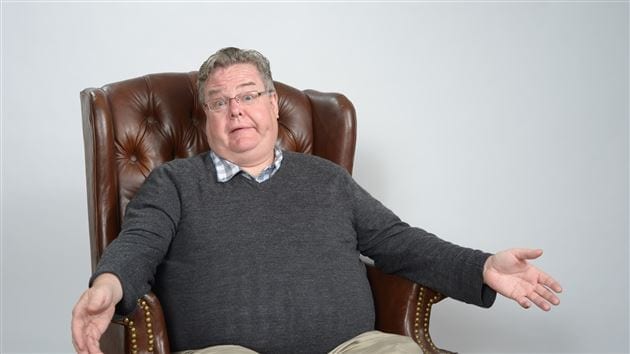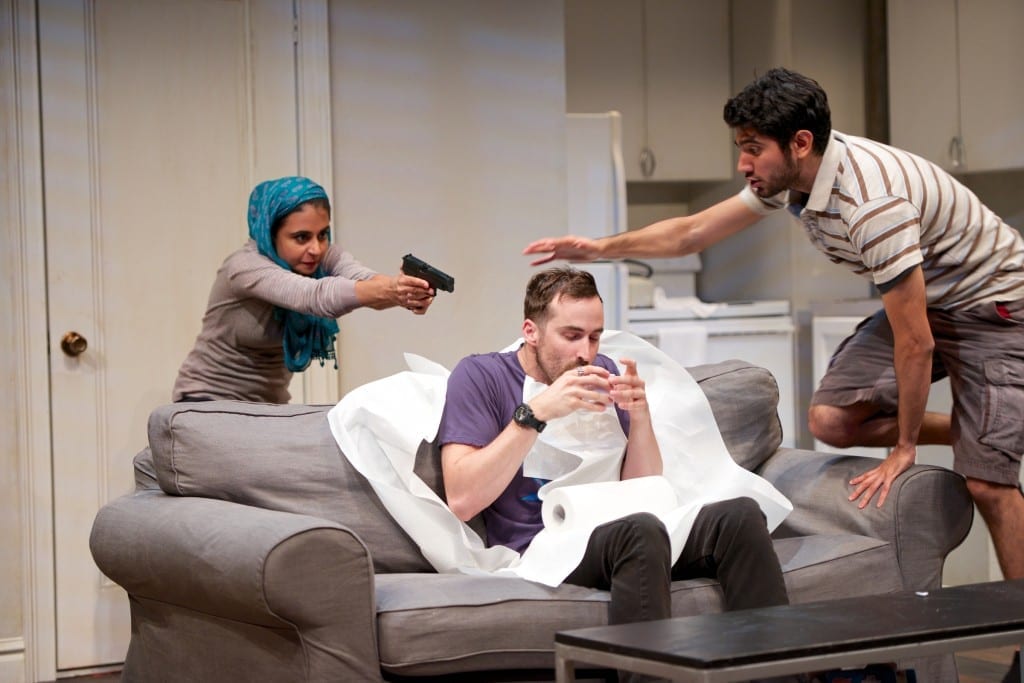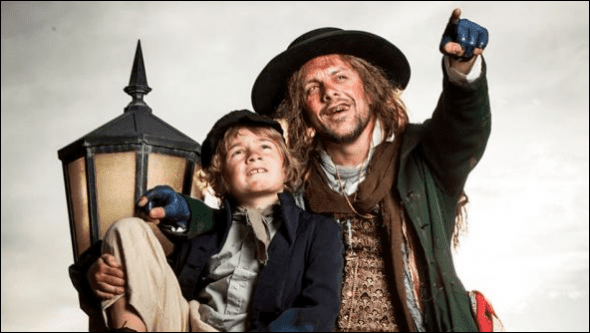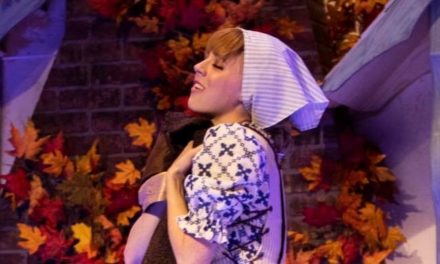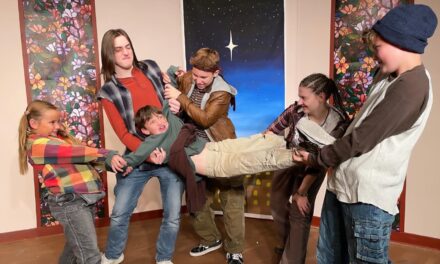OGDEN — On its surface, The Drowsy Chaperone is a parody of musical theater in the 1920’s with no fear of making the audience the butt of its jokes. As the Man in Chair (Tim White) plays the record of his favorite classical musical, his living room becomes the stage. As actors enter and exit through his furniture, the Man offers his commentary as a guide through the show. Through this commentary essential bits and pieces of the Man’s own story seep through. By skipping ahead to the exciting moments or pausing to languish in the awkward ones, the Man presents not only a synopsis of the fictional Drowsy Chaperone, but also a synopsis of his own life.
Before I get too far into my analysis, let me clearly state a few essential points. I loved both the show itself and this particular Ziegfeld Theater production. It’s not often that I see a show without first having listened to the soundtrack, and I think this lack of exposure set me up to be so thoroughly baited by Bob Martin‘s and Don McKellar‘s clever script (with music and lyrics by Lisa Lambert and Greg Morrison). For that reason, I feel compelled to write a somewhat vague review; I don’t want to ruin the magic for those who have not yet had the chance to see this production. If you are reading this review and contemplating whether you should attend, my advice is a resounding, “Yes,” followed quickly by, “but it is kind of hard to say why without ruining it for you.” If you are in that category, kindly stop reading, go see the show, and then read the rest of this review.
For those already familiar with the show’s surprises, I’ll admit to being caught on more than one occasion right where both writers and director Trent Cox seemed to want me. It happened first when the house lights went out and the theater remained dark for an awkwardly long period of time. My neighbor giggled in the darkness, and I leaned over to say, “So this is awkward for you, too?” I started to wonder whether to mention technical coordinator Quinn Kapetanov, light designer Derek Walden, or light board operator Chelsea Winters when I included this odd start in my review. Instead, I ended up feeling quite the fool when the opening cynical soliloquy was about the exact moment in the dark I was experiencing. And so it began. It happened again later when I had laughed ostensibly at Andrew Cole‘s over-the-top portrayal of the Latin lover, Aldolpho. I had been carefully lured into a trap which the Man sprung with a comment about the sophistication of modern theatrical audiences and their reticence to laugh at racial stereotypes. The worst ruse, however, took two careful acts to set up. It took clever writing, fascinating choreography, and tongue-in-cheek delivery to make certain I never noticed I was being lead somewhere unexpected. Even as the Man was purposefully proving to me that the purpose of musical theater was simply to entertain, the show was preparing me to accept its surprise ending. As I watched the characters he loved invite him into their world and as I watched him tearfully accept, I realized that this show had done exactly what musical theater is supposed to do. It changed me.
I have three pages of notes detailing the individual successes of this production, and I feel I owe it to the cast and crew to give a few of those specific kudos.
- Lindsey Blackman (Kitty) lit up the stage.
- Alina Gatrell‘s (Trix the Aviatrix) voice was the strongest in the cast, which is a huge compliment as I enjoyed each soloist.
- Kevin Neff (Robert Martin) looked and acted the part of the successful Hollywood star.
- Breann Johnson‘s (Janet Van De Graff) dance solo in “I Don’t Wanna Show Off” was both hilarious and skilled.
- Andrew Cole was perfectly over-the-top in his characterization of Aldolfo.
- Becky Cole‘s (The Drowsy Chaperone) was so vocally talented that she could be funny and still be that good.
- The gangster duo of Matt Baxter (Gangster 1) and Colton Ward (Gangster 2) had such comedic timing in “Toledo Surprise.”
- The Vaudeville comedy duo of Meredith Gibson (Mrs. Tottendale) and Danny Price (Underling) really hit their stride during “Love is Always Lovely in the End.”
- White’s (Man in Chair) recount of his divorce was the high point of the show. I found myself leaning forward in my seat as I hung on to every word he said.
- Becky Cole’s costume design was flawless. My favorites included the four different wedding dresses worn at the end which each fit the actress in a flattering way and stylistically supported the character development.
 Deserving of its own paragraph was the choreography by Kacee Neff and Josh White. Each dance was matched to the 1920’s time period, and the actors got to show off a variety of styles of the era. The tap number performed by Kevin Neff and Daniel Pack (Best Man George) was one of the best I have seen in community theater. Although Pack seemed to have a bit more experience than Neff, I enjoyed the times they tapped in unison. The “Monkey” sequence in the second act was not only comical but also very cleanly executed, and I enjoyed the clever movements used to mirror a wind up toy. This was one of the many moments in which the ensemble showed their dance skills were equal to those of the highly skilled leads. In general, I was impressed with the use of the small stage. Even when the 19-person cast took the stage simultaneously, the formations kept the stage from seeming too full. This was also thanks, in part, to the set constructed by Brandon Bills, Erica Choffel, and Kapetanov. Hiding entrances in the refrigerator, the book case, and a particularly impressive horizontally rotating wall allowed the rest of the stage to be used to its maximum capacity.
Deserving of its own paragraph was the choreography by Kacee Neff and Josh White. Each dance was matched to the 1920’s time period, and the actors got to show off a variety of styles of the era. The tap number performed by Kevin Neff and Daniel Pack (Best Man George) was one of the best I have seen in community theater. Although Pack seemed to have a bit more experience than Neff, I enjoyed the times they tapped in unison. The “Monkey” sequence in the second act was not only comical but also very cleanly executed, and I enjoyed the clever movements used to mirror a wind up toy. This was one of the many moments in which the ensemble showed their dance skills were equal to those of the highly skilled leads. In general, I was impressed with the use of the small stage. Even when the 19-person cast took the stage simultaneously, the formations kept the stage from seeming too full. This was also thanks, in part, to the set constructed by Brandon Bills, Erica Choffel, and Kapetanov. Hiding entrances in the refrigerator, the book case, and a particularly impressive horizontally rotating wall allowed the rest of the stage to be used to its maximum capacity.
It is hard to say for certain where the credit lies for this show’s success, but a large portion must be given to White as Man in Chair. Whether he was being informative or entertaining, whether building up or putting down the audience, whether relaxing in his chair or mopping up the very real messes made by his imagination, White kept the show on track. He set up the jokes. He provided the booze. He added the layers. He made the statements and posed the questions that begged the audience to argue. He tolerated the ringing telephone, the skipping record, and the tripped breaker in such a believable way that it seemed impossible not to draw the connections between the stage and real life. He explained in a way I never could have put words to that emotional response to a musical when he explained that he loved this musical, even though he’d never seen it.
I know I have gushed more than I have reviewed, but not every show I see leaves me wanting to stop strangers on the street to encourage them to go buy a ticket. So much of what musical theater has to offer is, at its heart, the same. The Drowsy Chaperone, with its classic show tunes and edgy wit, was like nothing I’ve seen before. If you’re willing to get something out of being entertained, don’t miss this production of The Drowsy Chaperone.

